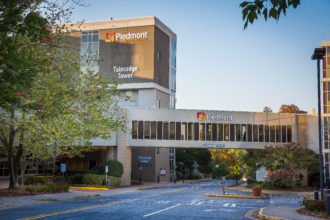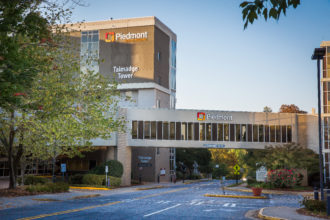Piedmont Athens Regional Medical Center has received state approval for a $171 million hospital renovation and construction project.

The project won’t add any beds to the hospital’s current capacity of 359, but it will include a new patient tower, which will replace what’s known as the 1919 Tower. As the name suggests, the present tower is nearly 100 years old – the oldest section of the hospital.
Piedmont Healthcare has pursued an expansion strategy that has added several hospitals in recent years, including some outside the system’s metro Atlanta base. Athens Regional was added in 2016, while Clearview Regional Medical Center in nearby Monroe became the 11th in the nonprofit Piedmont system this year, taking the new name Piedmont Walton.
State approval of the Athens project had been expected. Piedmont’s certificate-of-need application was not opposed by any competitor.
“As our community grows, we have to adapt and provide adequate amenities to our patients,’’ Dr. Charles Peck, president and chief executive officer of Piedmont Athens Regional, said in a statement. “This project we’re embarking on is going to replace old patient areas in our hospital, with state-of-the-art, newly renovated space that will better serve our patients and community.”

“Our goal is not only to improve patient access and care, but to also modernize and improve our hospital campus for our patients, visitors and staff, and we’re grateful for the community’s support as we work to meet the needs of our patients,” Peck said.
Construction is estimated to take about four years, with a completion date of fall 2022.
Chris Kane, a consultant with Progressive Healthcare, noted that Athens remains a competitive market, with Trinity Health owning St. Mary’s Hospital, and that each has strong bond ratings and access to capital.
“Periodic replacement of assets is essential to offer amenities and technology that consumers expect,’’ Kane said.
Such projects also help with recruiting and retaining medical staff, Kane added. “Physicians and other clinical professionals prefer health systems committed to continuous investments in patient care.’’

